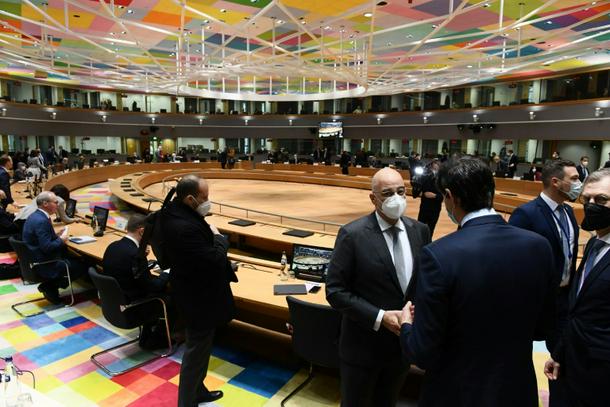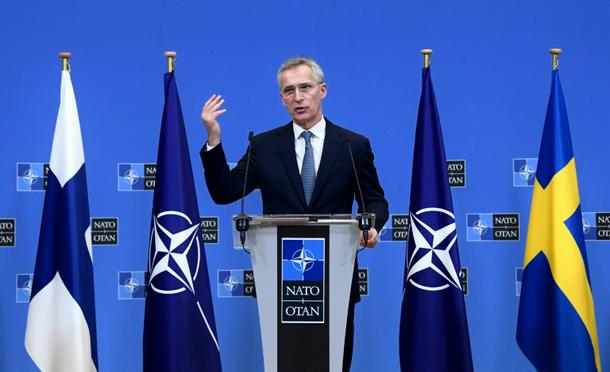
US Secretary of State Tony Blinken joined EU foreign ministers by video link as the allies discussed a massive sanctions package to deter Russian aggression against Ukraine
Brussels (AFP) - US President Joe Biden was set to hold talks on Monday with European leaders over the Ukraine crisis, as the EU urged allies to avoid a “nervous breakdown” in the face of fears Russia could stage a full-scale invasion.
Tensions have soared over Moscow’s deployment of some 100,000 troops and heavy armour at its neighbour’s borders, despite the Kremlin’s insistence it is not planning a new incursion almost eight years after it seized Crimea.
NATO said it was sending jets and ships to bolster its eastern European flank, as US media reported Washington was weighing deploying up to 5,000 troops to central and eastern European allies.
Fears of an attack by Moscow helped send global stocks sharply downwards – with Russia’s main market plunging and the central bank suspending foreign currency purchasing after the ruble slumped.
Britain and Australia followed the US in ordering diplomats’ families to leave Kyiv, while France told citizens to avoid non-essential travel to Ukraine.
But both Kyiv and the EU said any withdrawal of personnel was premature, amid doubts over how imminent any attack could be.
“You have to stay calm doing what you have to do, and avoid a nervous breakdown,” EU foreign policy Josep Borrell said after talks with US top diplomat Antony Blinken.
Blinken briefed EU foreign ministers on his talks last week with Russian counterpart Sergei Lavrov as the US gears up to give a formal response to Moscow’s raft of sweeping security demands.
Borrell said there was nothing in the latest discussion to increase fears the there would be an “immediate attack”.

NATO chief Jens Stoltenberg insisted the alliance 'will continue to take all necessary measures to protect' members and was considering deploying fresh battle groups to eastern allies
The US is trying to marshal allies to prepare an unprecedented package of sanctions on Moscow if it send in forces – and EU officials insist they could hit the Kremlin with “massive consequences” within days if needed.
Biden was set to hold a secure video call with the leaders of France, Germany, Britain, Italy, Poland, the EU and NATO.
The White House said the talks were “part of our close consultation and coordination with our transatlantic allies and partners in response to Russia’s military buildup on Ukraine’s borders”.
Moscow is demanding a guarantee that the former Soviet republic never be allowed to join NATO, as well as other concessions by the United States in return for a decrease in tension.
- NATO troops ‘on standby’ -
The US-led NATO alliance said its members were placing troops “on standby” and sending ships and jets to bolster eastern Europe’s defences in response to the Russian buildup, pointing to recent decisions by Denmark, Spain and the Netherlands to mobilise forces.
NATO chief Jens Stoltenberg insisted the alliance “will continue to take all necessary measures to protect” members and was considering deploying fresh battle groups to eastern allies.
The Kremlin accused NATO of ramping up tensions through “information hysteria” and “concrete actions”, claiming the risk of an offensive by Ukrainian troops fighting Russian-backed separatists in the east of the country was “very high”.
The EU – in consultation with the US and other allies – is pushing to put together a package of sanctions against Moscow that it hopes will help deter Russia from any military action.
“There’s no doubt we are ready to react forcefully with comprehensive sanctions – never seen before,” Danish Foreign Minister Denmark FM Jeppe Kofod said.
The 27-nation bloc faces a complex task compiling its raft of measures as members have starkly differing approaches and ties to Russia.
Ukrainian President Volodymyr Zelensky urged his western partners to “preserve the unity of all EU member states in protecting the sovereignty and territorial integrity of our state”.
The new government in EU economic powerhouse Germany has faced criticism from Kyiv over its refusal to send arms to Ukraine and hesitation over calls to cut Moscow out of the global SWIFT payment system.
German Foreign Minister Annalena Baerbock insisted any further aggression from Moscow would get a “clear response” from Europe and talked up the economic support Berlin gives Kyiv.
European Commission chief Ursula von der Leyen said the bloc was preparing a 1.2-billion-euro emergency financial aid package for Ukraine.
British Prime Minister Boris Johnson warned Russia an invasion could prove to be a “new Chechnya” – referring to Moscow’s bloody conflict in the 1990s over the territory.
Non-NATO member Ireland meanwhile sounded the alarm over upcoming Russian military exercises off its southwest coast in the international waters of the Atlantic.